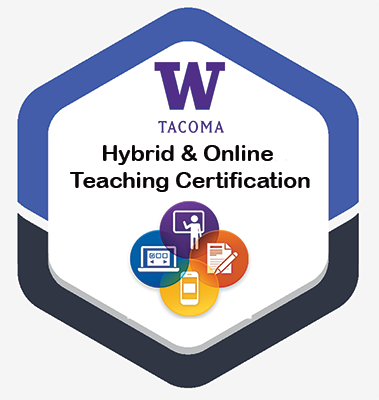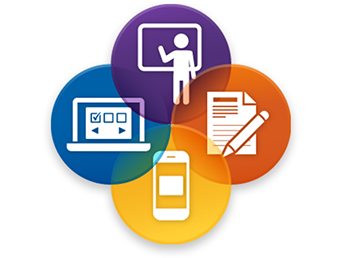Main Content
Advancing inclusive pedagogy and practice

What is required to teach Hybrid or Online at UW Tacoma?
To offer a course hybrid or online at the University of Washington Tacoma, the faculty teaching must be certified. The Hybrid and Online Teaching Certification Initiative is a collaboration between the Executive Vice Chancellor for Academic Affairs (EVCAA) Office, Executive Council, our academic programs, and the Office of Digital Learning.
A certification course, currently called Teaching Online and Hybrid 101, will be offered every quarter (see below for information and registration forms).
This is a faculty-approved process that was originally passed by APCC and EC in 2016 and was most recently updated in the recently adopted 2022 Faculty Assembly DL policy.
Certification is required for any instructor teaching online or hybrid courses at UW Tacoma.
ODL currently offers two pathways to certification:
Pathway 1:
- Complete a Teaching 101 course offering.
- Prepare a course for review using the Tri-Campus Online/Hybrid Course Development and Teaching Evaluation Rubric.
- Submit a Course Review Request, and pass the subsequent internal Review by the Office of Digital Learning.
Pathway 2:
For faculty with online teaching certification from a professional organization or program.
- Contact Office of Digital Learning.
- Provide evidence of online teaching certification, such Quality Matters APPQMR or completion of UW's TTFI program in 2022 or 2023.
- Prepare a course for review using the Tri-Campus Online/Hybrid Course Development and Teaching Evaluation Rubric.
- Submit a Course Review Request, and pass the subsequent internal Review by the Office of Digital Learning.
If an instructor is planning to complete an online certification or development program to meet the requirements of Step 2 above, they are encouraged to contact the Office of Digital Learning to ensure that it has sufficient parity with the learning objectives of the Teaching 101 course.

Using the UW Hybrid/Online Course Development and Evaluation Rubric ensures that critical elements of design (not content) work together to ensure that your students will achieve your desired learning outcomes and that the review is the application of the rubric, not the opinion of the reviewer.
Once you become a certified, you are free to teach any course that your program supports as hybrid or online
- List of UWT Faculty certified to teach hybrid or online.
How does UW Tacoma define Hybrid and Online?
The Distance Learning Policies are set by each school. Certification is required for the three hybrid and online types described in the UW course mode definitions. Instructors that successfully complete the UW Tacoma hybrid and Online Certification process become certified to teach online and hybrid courses without further review.
What is required to pass course review?
Once the instructor has attended the Hybrid and Online Teaching course and completed building their hybrid or online course site in Canvas using the UW Hybrid/Online Course Development and Evaluation Rubric, they initiate their review by submitting a Course Evaluation Request form.
To pass the review, the course must demonstrate "Established Practice" for at least 85% (18/21) of the objectives, including required objectives: 1.1, 1.2, 2.2, 2.3, 3.4, and 4.1.
What approvals do I need if I want to teach hybrid or online?
A number of steps are involved for all courses offered in hybrid/online format. Be sure to have the permission of your dean/director/chair to develop and offer a course online.
IF this is a new course never offered in any modality, please have it approved as a UWT course for the catalog first. All UW standard paperwork will need to be completed and the course approved before applying for certification and taking it through review. Consult APCC for more information.
Are there any deadlines I need to keep in mind?
- Check with your program on Time Schedule deadlines. Courses must have their mode of instruction determined and approved before the Time Schedule goes live. Faculty must be certified prior to teaching their first hybrid or online course.
- Course review submission deadlines:
- 3/8/24 to be certified for Spring 24
- 5/31/24 to be certified for Summer 24
What else do I need to know?
It's not about the technology; it's about engaging our learners, demonstrating our passion for the subject, and learning from colleagues trying new pedagogies. Here's a quick list of 8 lessons learned:
8 Lessons Learned from Teaching Online from EDUCAUSE on Vimeo.
What if I was just hired and a certification course is not offered before I have to teach?
First, check with your department to see if you have approval to teach hybrid/online. We understand that sometimes timing is an issue. We have a temporary solution to allow faculty, who need to teach online or hybrid before a certification opportunity becomes available:
- Register for the next offering of Teaching Online 101. The instructor will be listed as provisionally certified for that term.
- After completing Teaching 101, build a course and take it through the review process. You will then be certified.
Until the above process is completed, EACH hybrid or online course taught must be informally reviewed PRIOR to offering.
Once certification is obtained, no further reviews are necessary.
UWT certification/Teaching 101 Course Offerings
Questions about UWT certification requirements or Teaching 101?
Contact Chris Lott - clott@uw.edu
